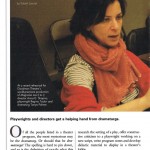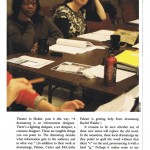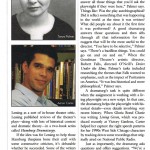This article by Robert Loerzel originally appeared in Playbill magazine in October 2009.
Of all the people listed in a theater program, the most mysterious may be the dramaturg. Or should that be dramaturge? The spelling is hard to pin down, and so is the definition of exactly what this person does.
“I wish I had a pithy way of describing it,” says Tanya Palmer, dramaturg and literary manager at the Goodman Theatre. “It encompasses a lot of different roles.” Here are a few of the tasks a dramaturg might perform: dig up the history of an old play, research the setting of a play, offer constructive criticism to a playwright working on a new script, write program notes and develop didactic material to display in a theater’s lobby.
Aaron Carter—who holds the job at Victory Gardens Theatre—and some of his colleagues have been trying to think of a new title. Carter likes to say he’s a “dramatic engineer.” He’s heard one dramaturg call herself a “playwright whisperer.” Meghan Beals McCarthy, dramaturg at Northlight Theatre in Skokie, puts it this way: “A dramaturg is an information designer. There’s a lighting designer, a set designer, a costumer designer. Those are tangible things you can point to. The dramaturg decides what information gets to the audience and in what way.” (In addition to their work as dramaturgs, Palmer, Carter and McCarthy are also literary managers at their theaters, trying to find noteworthy new plays. And Palmer will have a play of her own, Joan D’Arc, adapted from Friedrich Schiller’s Die Jungfrau von Orleans, in the Goodman’s Owen Theatre this fall. As she works on the script with Bosnian director Aida Karic, Palmer is getting help from dramaturg Rachel Walshe.)
It remains to be seen whether any of these new terms will replace the old word. In the meantime, these local dramaturgs say they prefer to spell the word without that silent “e” on the end, pronouncing it with a hard “g.” Perhaps it makes sense to use the hard German pronunciation of dramaturg instead of the soft French version, dramaturge. After all, the founding father of dramaturgy was Gotthold Ephraim Lessing, a German who was known for attacking French playwrights. In 1766, a new national theater in Hamburg hired Lessing as a sort of in-house theater critic. Lessing published reviews of the theater’s plays—along with lots of historical context and dramatic theory—in a two-book series called Hamburg Dramaturgy.
If the idea was for Lessing to help those Hamburg thespians hone their craft with some constructive criticism, it’s debatable whether he succeeded. Some of the writers were stung by his harsh words. “Since he pulls down everything, nearly all courage for further effort has oozed out of me,” one discouraged playwright lamented. But Lessing set a new standard for how to analyze plays, and theaters began employing dramaturgs to bring that sort of thoughtful context to their productions.
In some cases, dramaturgs work on plays that were written a long time ago by playwrights who are no longer living. In that case, the dramaturgs really have their work cut out for them. “You’re trying to answer all those things that you’d ask the playwright if they were there,” Palmer says. Things like: Was the play autobiographical? Did it reflect something that was happening the world at the time it was written? What did people say about it the first time it was performed? A good dramaturg answers those questions and then sifts through all that information for the nuggets that will be the most useful to the director. “You have to be selective,” Palmer says. “There’s a bazillion things. You could go on and on and on.” When the Goodman Theatre’s artistic director, Robert Falls, directed Eugene O’Neill’s Desire Under the Elms, Palmer’s tasks included researching the themes that Falls wanted to emphasize, such as the impact of Puritanism on America. “It was less historical and more philosophical,” Palmer says.
A dramaturg’s task is quite different when the assignment is working with a living playwright on a new script. In that case, the dramaturg helps the playwright with historical details—even details involving very recent history. When Gloria Bond Clunie was writing Living Green, which was produced recently at Victory Gardens, Carter helped her capture the right speech patterns for her 1990s West Side Chicago characters by tracking down some recordings that originally aired on National Public Radio.
Just as importantly, the dramaturg asks questions and offers suggestions. “We’re a sounding board, helping the playwright realize her vision of the play,” explains Carter. If a playwright’s idea isn’t coming through in a scene, the dramaturg tries to spark a better rewrite by talking it over. “Really,” says Carter, “you’re just someone who listens well, and knows how to talk the play out of them.”



